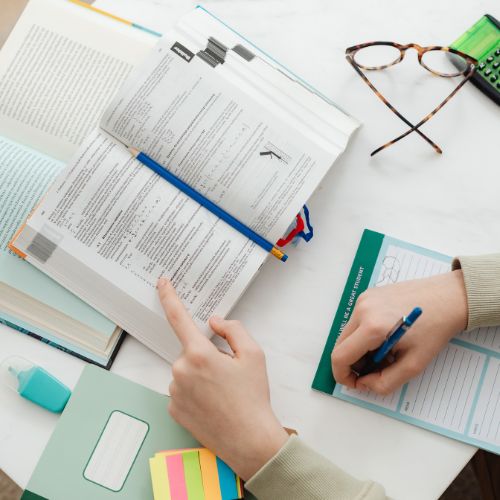Studying for A-levels is often seen as a crucial stage in a student’s academic journey, but it’s essential to recognise that this path is filled with challenges that can test even the most determined minds.
As an A-level student, you can encounter sleepless nights, stress-induced anxiety, and moments of self-doubt during this demanding phase. This journey has many roadblocks, such as a race against time, an overwhelming amount of material to grasp, and uncertainty surrounding grades.
But you don’t have to struggle alone. This blog covers the five essential study habits of highly successful A-level students. These habits are practices adopted by those who have successfully treaded this challenging path before you.
So, read on because the journey to becoming a highly successful A-level student begins here.
Habit 1: Goal-Oriented Planning

Successful A-level students understand the significance of goal-oriented planning and utilise it as a powerful tool for academic excellence. Here’s a closer look at this crucial habit:
Setting Clear Academic Goals
Practical goal setting is the first step toward success. Start by establishing clear, specific, and achievable academic goals. These goals act as motivation and provide direction in studies.
Creating a Study Plan
Once goals are defined, the next step is to create a comprehensive study plan. A well-structured plan outlines what needs to be studied, when, and for how long. It ensures that all topics are covered systematically.
The study plan might allocate specific days or hours for different subjects, allocating more time to areas where you need improvement.
Effective Time Management
A crucial aspect of goal-oriented planning is efficient time management. Successful A-level students understand the value of time and allocate it wisely to various subjects and activities. Techniques like the Pomodoro method or time blocking help maximise your study time.
Adaptability and Flexibility
While planning is essential, adaptability is equally vital. You should be open to adjusting your plans based on the progress and challenges encountered. If you realise that a particular topic requires more time and attention, be willing to reallocate study hours accordingly.
Tracking and Celebrating milestones
Tracking progress toward academic goals and celebrating small victories is a crucial motivator. Acknowledge your achievements and reinforce your commitment to your goals.
Recognising when you’ve successfully mastered a challenging concept and rewarding yourself with a short break or a small treat can be a motivating milestone.
Habit 2: Active learning techniques

Active learning isn’t just about staying busy; it’s about deepening your understanding, enhancing memory retention, and fostering critical thinking skills.
Incorporating these techniques into your A-level study routine will allow you to absorb information more effectively and find your learning experience more engaging and enjoyable.
Active learning is a game-changer, and here’s how these students make the most of it:
Defining Active Learning
Active learning involves engaging with study materials rather than passively reading or listening. It’s about becoming an active participant in the learning process. Instead of simply reading a textbook, active learners might explain the concepts to themselves or others as if they were the teacher.
Summarising and Teaching
Summarising what you’ve learned and teaching it to someone else is a powerful method for retention. It forces you to understand the material deeply. After studying a chapter, summarise its main points and teach them to a friend or family member.
Self-Testing
Self-testing involves challenging yourself with questions and problems related to the subject matter. It’s an effective way to identify your weak points. Create practice quizzes or solve problems without looking at the solutions. It helps you gauge your understanding.
Active Participation in discussions
Engaging in class discussions, study groups, or online forums encourages active participation. It exposes you to different perspectives and keeps you engaged. Share your opinions and ask questions during class discussions or study group sessions.
Application of Knowledge
Applying what you’ve learned to real-life situations or scenarios reinforces understanding. For example, try to relate the principles you’ve learned to everyday phenomena if you’re studying physics.
Visual Aids and Mind Mapping
Creating visual aids like diagrams, charts, or mind maps can help organise information visually, making it easier to grasp complex topics. Use mind mapping software or draw diagrams to illustrate complex processes.
Active Reading Strategies
Instead of reading passively, highlight, underline, or take notes in the margins. It keeps your mind engaged. Annotate your textbooks with comments, questions, and connections to other concepts.
Collaborative Learning
Collaborating with peers for group study or projects promotes active learning through discussions, debates, and shared knowledge. Work on group assignments where each member contributes actively to research and discussions.
Habit 3: Effective Note-Taking

Mastering effective note-taking is a skill that serves you during A-levels, in higher education, and beyond. Developing this habit gives you a powerful tool to condense information, deepen your understanding, and excel in your academic journey.
Note-taking isn’t just about scribbling down what the teacher says; it’s an art that highly successful A-level students master. Here’s a deep dive into this essential habit:
The art of effective note-taking
Effective note-taking involves capturing critical information, organising it logically, and creating a valuable study resource. Your notes should be a condensed version of the most important concepts covered in a lecture.
Choosing the right note-taking method
Different subjects and learning styles may require other note-taking methods. It’s crucial to choose the one that suits you best. For example, In math or science, you prefer structured outlines, while in literature or history, you might use the Cornell note-taking method.
Active Listening and Engagement
Effective note-taking starts with active listening during lectures. Engaging with the material helps you identify what’s most important. Ask questions during the class to clarify doubts or request elaboration on complex topics.
Local Organization
Notes should be logically organised, with clear headings and subheadings. This structure aids comprehension and revision. Use bullet points, numbering, or indentation to create a hierarchy of information.
Conciseness Is Key
Avoid excessive detail in your notes. Focus on the main ideas, key concepts, and supporting examples. Instead of copying a lengthy definition, write a concise summary in your own words.
Digital vs. Handwritten Notes
Some students prefer digital note-taking, while others prefer traditional handwritten notes. Both can be effective; choose what suits you. Digital notes offer searchability and easy access, while handwritten notes can improve retention.
Note-Taking During Self-Study
Effective note-taking extends beyond the classroom. It’s equally important when studying independently from textbooks or online resources. Take notes while reading your books, summarising each section as you go.
Habit 4: Self-Assessment and feedback integration

Highly successful A-level students understand the value of continuous self-assessment and the role of constructive feedback in their journey to excellence. Here’s a closer look at this pivotal habit:
Regular Self-Assessment
Self-assessment involves evaluating your understanding of a topic or concept. It’s a proactive approach to identifying your strengths and weaknesses. After studying a chapter, pause to assess how well you grasp the key ideas and whether you can explain them clearly.
Setting Learning Objectives
Establish clear learning objectives for each study session or topic. These objectives guide your self-assessment and help you focus on what’s most important.
For instance, before diving into a chemistry lesson, set an objective to understand the chemical reactions involved in a specific process.
Questioning Your Knowledge
Ask yourself probing questions to assess your comprehension. For example, if you’re studying history, ask yourself questions like, “What were the main causes of this historical event?” or “What were its consequences?”
Seeking Constructive Feedback
Actively seek feedback from teachers, peers, or even online resources. Constructive feedback provides valuable insights into areas that need improvement. Share your essays or practice papers with teachers or peers and ask for feedback on your writing style and content.
Feedback Integration
Receiving feedback is insufficient; you must integrate it into your study routine. Use feedback to refine your understanding and skills. If a teacher points out that your essays lack depth, work on incorporating more detailed examples and analysis.
Track Your Progress
Maintain a record of your self-assessments and the feedback received. It helps you track your progress over time. Use a study journal or spreadsheet to document your self-assessment scores and feedback received.
Adapt and Improve
Highly successful A-level students view self-assessment and feedback as opportunities for growth. They adapt their study strategies based on what they learn. For example, if feedback suggests you struggle with time management during exams, explore time-management techniques to improve.
Balancing Confidence and Humility
While confidence in your abilities is essential, humility allows you to acknowledge areas that need improvement. Striking this balance is critical. Recognise your strengths and achievements, but remain open to feedback highlighting areas for development.
Habit 5: Active Revision Techniques

Transform your study sessions into dynamic, engaging experiences by embracing active revision techniques. These techniques stimulate your cognitive processes, deepen your understanding, and ultimately lead to improved academic performance.
Revision is about something other than mindlessly rereading notes. It’s about actively engaging with the material to enhance retention and understanding. Here’s how they make the most of their revision sessions:
Interactive Study Techniques
Active revision involves techniques that engage multiple senses and encourage interaction with the material. Examples include flashcards, mind maps, and interactive quizzes. Create flashcards with crucial terms on one side and definitions or explanations on the other.
Practice with past papers
Highly successful students recognise the value of practising with past exam papers. These papers provide insight into the format and types of questions that may appear. Dedicate time to solving past papers under timed conditions to simulate exam scenarios.
Active Summarization
Summarising complex topics in your own words forces you to distil information to its core elements. It deepens your understanding and aids memory retention. Write a concise summary highlighting the main points after reading a chapter.
Spaced Repetition
Spaced repetition involves revisiting material at increasing intervals over time. This technique reinforces memory and improves long-term retention. Use spaced repetition apps to schedule review sessions for specific topics.
Exploring Multiple Resources
Successful students don’t limit themselves to one textbook or source. They explore multiple resources, which offer different perspectives and explanations. Watch educational videos, consult alternative books, or explore online courses for additional insights.
Achieving A-Level Excellence: Cultivating Success Habits
By embracing these habits, you can embark on a journey of academic achievement and personal growth that sets you apart.
As we’ve explored the critical study habits of highly successful A-level students, remember that adopting them is a journey. It’s not about perfection but about progress.
In your A-level journey, partner with Advo Education Centre, where such practices are incorporated into the program to help you cultivate a good learning habit that lasts you a lifetime.
Over the years of working with thousands of A-level students, we understand your key challenges. For each challenge, we have devised a solution to assist.
Make an appointment with our friendly coaches today for a complimentary Diagnostic session to:
- Identify the current gaps you are facing
- Proposed solutions to assist you
With Advo, learning can be easy and fun with the right system in place!

